May 23, 2025 | 06:50 GMT +7
May 23, 2025 | 06:50 GMT +7
Hotline: 0913.378.918
May 23, 2025 | 06:50 GMT +7
Hotline: 0913.378.918
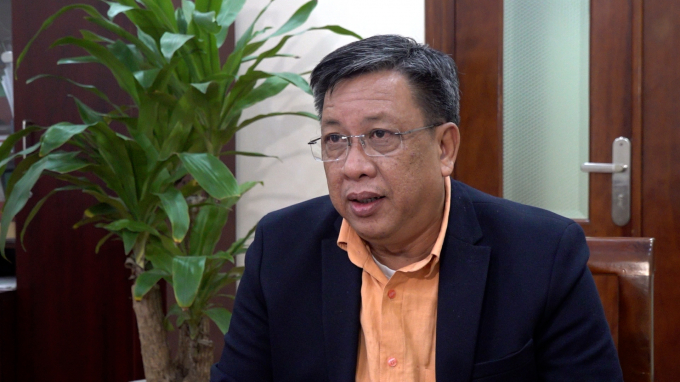
Le Thanh Tung, Deputy Director of the Department of Crop Production under the Ministry of Agriculture and Rural Development. Photo: Minh Phúc.
What do you evaluate the impacts of the VnSAT project in promoting the development of the "1 must 5 reduction" model of rice cultivation and the application of mechanization at all stages in the value chain in the Mekong Delta, which thereby changed farmers' awareness, behavior, and technical level as well as promoted the agricultural restructuring?
First of all, we see that the transition from the model of rice farming "3 decrease, 3 increase" to "1 must 5 decrease" has integrated a lot of technical advances at all stages of the rice cultivation process. In order for each advanced technology to reach farmers, we have had many training activities. The VnSAT project is an opportunity for us to bring together individual technical advances and train more systematically, in a more sustainable, long-term nature.
At the same time, we turn factors that used to be qualitative (such as reducing varieties, fertilizers, pesticides, etc.) into specific numbers through its quantification. From there, it is possible to calculate the effects brought about by the application of the "1 must 5 reduction" technique.
On the other hand, in the process of implementing "1 must 5 reduction", the VnSAT project has supported the stages of mechanization that we are lacking, such as drying, harvesting by combine harvesters. Those techniques are brought together into a complete process, making it easier for farmers to do.
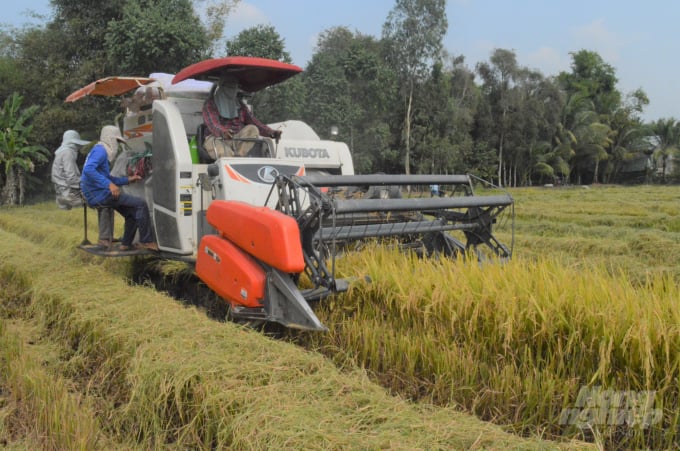
The VnSAT project has supported and created a positive change in the mechanisation of rice production in the Mekong Delta. Photo: Minh Dam.
What about the role of the VNSAT project in supporting the Mekong Delta localities to develop rice value chains from preservation, processing, brand development, domestic product consumption and export?
Previously, regarding rice farming activities in the Mekong Delta in particular and in Vietnam in general, we all mentioned the value chain of rice products from production to consumption. However, it did not forme a clear chain and were not adapted to each rice production area because each production area needs to form a different chain, based on its competitive advantages.
Therefore, the VnSAT project entered 8 rice production areas of the Mekong Delta with specific condition and large-scale nature, thereby forming a chain of rice production and consumption for the provinces, generating benefits, advantages in their chain production, overcome disadvantages so that farmers could participate in the market more easily?
The VnSAT project also supports farmers and cooperatives in the Mekong Delta region to build and develop advanced models in irrigation, water saving and loans. What are the impacts of these support packages on rice production in the Mekong Delta?
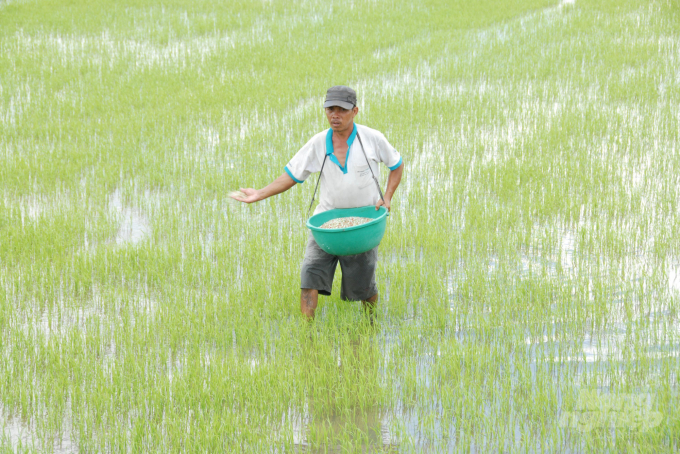
The VnSAT project has had a very positive impact on reducing greenhouse gas emission in rice farming in our country. Photo: Minh Dam.
I think that the VnSAT project's promotion of alternate wetting and drying (AWD) irrigation technology is of great significance in agricultural farming in Vietnam because we joined the Paris Agreement on climate change, especially the content of national self-determination on reducing greenhouse gas emission.
AWD is one of the effective measures to reduce greenhouse gas emission in rice production. Meanwhile, the traditional method of flooding in the past caused huge greenhouse gas emissions.
Secondly, this is a measure that can be applied on a large scale in localities with good irrigation management systems. With local specialized agencies, the management system of the irrigation sector from the central to the grassroots, the project VnSAT has promoted the operation and regulations of water for production, thus saving costs.
Alternate wetting and drying' (AWD) also brings technical factors, limiting pests to crops, making rice plants healthier, saving pesticides, saving water and helping to reduce emissions of greenhouse gases. This is also a solution that we can easily apply digitalisation, promoting digital transformation in agriculture.
According to the World Bank (WB), the VnSAT project is a successful example of international cooperation in all aspects and all targets. So in your opinion, how have these results impacted the development of the rice industry in the context of sustainable integration and especially the restructuring of the cropping industry?
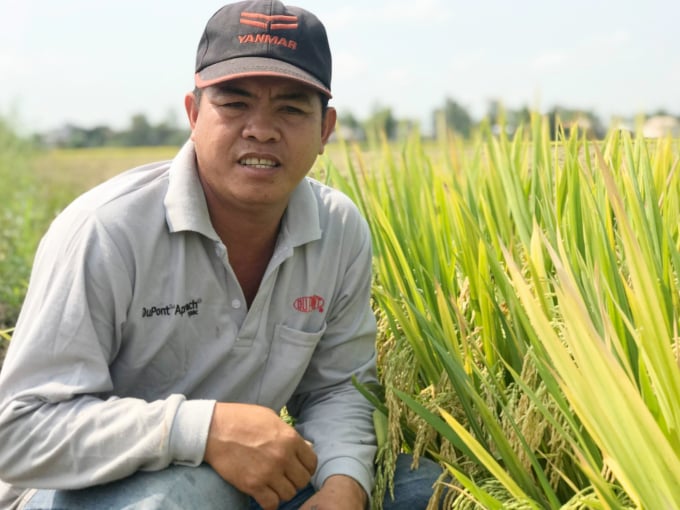
The VnSAT project ‘s impacts have reached the areas where the project is not directly implemented. Photo: MD.
First of all, the VnSAT project is implemented on a scale of rice cultivation area that accounts for one tenth of the total rice area of the Mekong Delta. However, its impacts spread much more widely. Although we have not measured it yet, we have seen very clearly the efficiency of rice production over the years. Specifically, the production cost of rice in the provinces tends to decrease and the quality of rice increases.
In particular, when the VnSAT project implemented technical elements, its strengths were proved. Measuring how many kilograms of fertilizer we can reduce can help us identify how much farmers could save. As the project takes place continuously in all rice production seasons of the year, local authorities, local stakeholders, specialised agencies of the Ministry of Agriculture and Rural Development, the VnSAT Project Management Board and the donor have joined together and worked effectively.
As a result, the VnSAT project schedule was completed and the project help localities fulfill their political, economic, social and environmental tasks. Those elements intertwine, making this project ‘s results more vivid and more sustaining.
The Ministry of Agriculture and Rural Development assigned the Department of Crop Production to develop a strategy for the development of the crop industry to 2030. Do you think that the results of the VnSAT project could facilitate the development of the strategy?
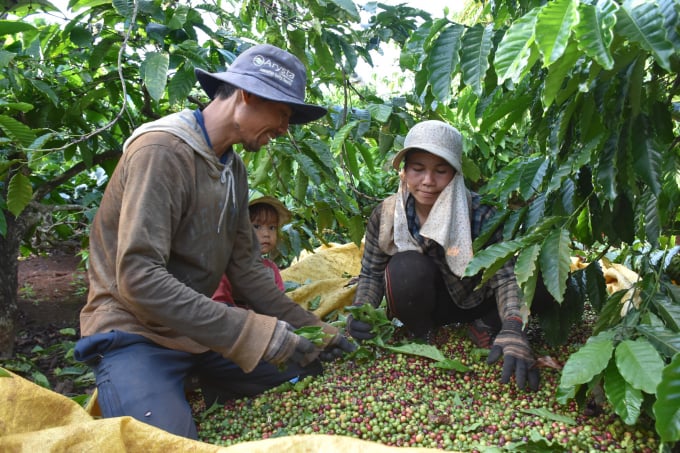
Along with rice, the VnSAT project has significantly increased the value of the coffee industry in the Central Highlands. Photo: MP.
The VnSAT project is a large-scale program in term of methodological nature, approaches and implementation. Besides promoting the sustainable rice value chain, the project also targeted the coffee value chain. It offered valuable lessons for the horticulture industry for other commodities such as vegetables and fruits.
This is the orientation for agricultural production in the coming time to ensure quality, sustainable valuea and environmental protection. It also has the nature of agricultural economy and circular economy. So, we need to promote the application of technical and organisational solutions according to the approach of the VnSAT project towards a sustainable production.
Environmental sustainability is understood as we both adapt to changes and minimise harmful impacts on the environment. Therefore, in the future strategy of the farming industry, we will continue to maintain these rice production techniques not only for the Mekong Delta but also expand to coffee farming in the Central Highlands and other crops across the country, especially fruit trees.
Deputy Minister of Agriculture and Rural Development Le Quoc Doanh said that the ministry would carefully examine and evaluate the implementation models of the VnSAT project in the Mekong Delta. It would also organise conferences to find out difficulties and obstacles during the implementation and discuss solutions. Besides ensuring the progress of the sub-projects, relevant units are urged to continue to focus on training and expanding the models under the VnSAT project as well as evaluating the results in actual production.
The VnSAT project will be completed in less than six months. Therefore, the units need to quickly complete the project closing procedures based on the guidance from the relevant decrees. It is also necessary to coordinate and promote the values of the VnSAT project to society.
Translated by Hien Anh
![Reducing emissions from rice fields: [2] Farmers’ commitment to the soil](https://t.ex-cdn.com/nongnghiepmoitruong.vn/608w/files/news/2025/05/05/dsc08881jpg-nongnghiep-140632.jpg)
(VAN) Clean rice cultivation model in Thuong Tan commune, Bac Tan Uyen district, is assisting local residents in achieving sustainable agriculture by substantially reducing costs, increasing productivity, and protecting the environment.

(VAN) At the conference to disseminate Resolution No. 68, AgriS introduced its digital agricultural ecosystem and reaffirmed its commitment to accompanying the Government in promoting private sector development and sustainable agriculture.

(VAN) 'Blue Ocean - Blue Foods' initiative is designed to restore marine ecosystems and establish sustainable livelihoods for local communities by cultivating a minimum of 1,000 hectares of cottonii seaweed in the first three years.
/2025/05/21/4642-3-112707_603.jpg)
(VAN) The V-SCOPE project has made direct contributions to three out of six pillars of the Comprehensive Strategic Partnership between Vietnam and Australia.

(VAN) Facing the threat of rabies spreading to the community, Gia Lai province urgently carries out measures to vaccinate dogs and cats on a large scale.

(VAN) Disease-free livestock farming not only protects livestock herds but also stabilizes production and livelihoods for many farmers in Tuyen Quang.

(VAN) Japan's grant aid project contributes to capacity building, promoting organic agricultural production, and fostering sustainable community development in Dong Thap province.